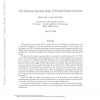Free Online Productivity Tools
i2Speak
i2Symbol
i2OCR
iTex2Img
iWeb2Print
iWeb2Shot
i2Type
iPdf2Split
iPdf2Merge
i2Bopomofo
i2Arabic
i2Style
i2Image
i2PDF
iLatex2Rtf
Sci2ools
178
click to vote
IFIP
2004
Springer
2004
Springer
The Inherent Queuing Delay of Parallel Packet Switches
The parallel packet switch (PPS) extends the inverse multiplexing architecture, and is extensively used as the core of contemporary commercial switches. A key factor in the performance of a PPS is its demultiplexing algorithm, responsible for dispatching cells to the middle-stage switches. This paper investigates the inherent queuing delay and delay jitter introduced by the PPS’s demultiplexing algorithm, relative to an optimal work-conserving switch. We show that the inherent queuing delay of a symmetric and fault-tolerant N ×N PPS, where every demultiplexing algorithm dispatches cells to all the middle-stage switches is Ω(N), if there are no buffers in the PPS input-ports. If the demultiplexing algorithms dispatch cells only to part of the middle-stage switches, the queuing delay and delay jitter are Ω(N/S), where S is the PPS speedup. These lower bounds hold unless the demultiplexing algorithm has full and immediate knowledge of the switch status. (The specific constants, ...
Communications | Demultiplexing Algorithms | IFIPTCS 2004 | Inherent Queuing Delay | Queuing Delay |
Related Content
| Added | 02 Jul 2010 |
| Updated | 02 Jul 2010 |
| Type | Conference |
| Year | 2004 |
| Where | IFIP |
| Authors | Hagit Attiya, David Hay |
Comments (0)

